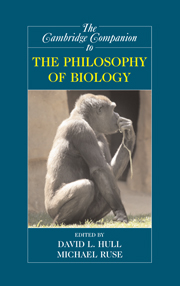Book contents
- Frontmatter
- 1 Adaptation
- 2 Population Genetics
- 3 Units and Levels of Selection
- 4 What’s Wrong with the Emergentist Statistical Interpretation of Natural Selection and Random Drift?
- 5 Gene
- 6 Information in Biology
- 7 Reductionism (and Antireductionism) in Biology
- 8 Mechanisms and Models
- 9 Teleology
- 10 Macroevolution, Minimalism, and the Radiation of the Animals
- 11 Philosophy and Phylogenetics: Historical and Current Connections
- 12 Human Evolution: The Three Grand Challenges of Human Biology
- 13 Varieties of Evolutionary Psychology
- 14 Neurobiology
- 15 Biological Explanations of Human Sexuality: The Genetic Basis of Sexual Orientation
- 16 Game Theory in Evolutionary Biology
- 17 What Is an ‘Embryo’ and How Do We Know?
- 18 Evolutionary Developmental Biology
- 19 Molecular and Systems Biology and Bioethics
- 20 Ecology
- 21 From Ecological Diversity to Biodiversity
- 22 Biology and Religion
- 23 The Moral Grammar of Narratives in History of Biology: The Case of Haeckel and Nazi Biology
- Reference List
- Index
- Series List
19 - Molecular and Systems Biology and Bioethics
Published online by Cambridge University Press: 28 April 2008
- Frontmatter
- 1 Adaptation
- 2 Population Genetics
- 3 Units and Levels of Selection
- 4 What’s Wrong with the Emergentist Statistical Interpretation of Natural Selection and Random Drift?
- 5 Gene
- 6 Information in Biology
- 7 Reductionism (and Antireductionism) in Biology
- 8 Mechanisms and Models
- 9 Teleology
- 10 Macroevolution, Minimalism, and the Radiation of the Animals
- 11 Philosophy and Phylogenetics: Historical and Current Connections
- 12 Human Evolution: The Three Grand Challenges of Human Biology
- 13 Varieties of Evolutionary Psychology
- 14 Neurobiology
- 15 Biological Explanations of Human Sexuality: The Genetic Basis of Sexual Orientation
- 16 Game Theory in Evolutionary Biology
- 17 What Is an ‘Embryo’ and How Do We Know?
- 18 Evolutionary Developmental Biology
- 19 Molecular and Systems Biology and Bioethics
- 20 Ecology
- 21 From Ecological Diversity to Biodiversity
- 22 Biology and Religion
- 23 The Moral Grammar of Narratives in History of Biology: The Case of Haeckel and Nazi Biology
- Reference List
- Index
- Series List
Summary
Molecular biology has set itself the task of looking for the fundamental pieces with which the biological jigsaw is to be put together. Not surprisingly (but with surprising efficacy), it has found many of them, and there are certainly more to come. Once found, these pieces can be arranged on a page next to one another in a reasonable sequence, and . . . Behold! An organism! Well, not quite.
Cohen and Rice 1996, 239The philosophy of molecular biology was, for a time, entirely preoccupied with reduction and reductionism: primarily the reduction of classical genetics to molecular genetics (Kitcher 1984, Waters 1994, Sarkar 1998), but also and more recently the reduction of complex organismal phenotypes to genes (Rosenberg 1997, Sarkar 1998). While these remain of substantial interest, some new areas of interest have also emerged, including philosophical attention to molecular mechanisms (Machamer, Craver, and Darden 2000, Darden and Tabery 2005) and mathematical models (Keller 2002, Sarkar 2005). In-depth focus on the intricate details of the science is increasingly commonplace (e.g., Schaffner 2000, Burian 2004, Sarkar 2005). Molecular biology has also proved to be of philosophical interest not only for its own sake, but also in the service of molecular explanations of evolution (e.g., Burian 2004), disease (e.g., Kitcher 1996), and behavior (e.g., Schaffner 2000), inter alia.
- Type
- Chapter
- Information
- The Cambridge Companion to the Philosophy of Biology , pp. 361 - 371Publisher: Cambridge University PressPrint publication year: 2007
- 2
- Cited by



